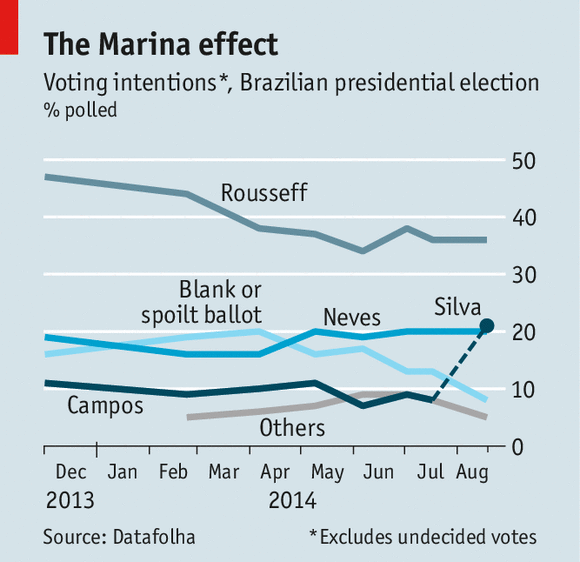Brazil’s presidential campaign
The third way
Marina Silva upsets the electoral calculus
Aug 23rd 2014
SÃO PAULO
IN HIS presidential bid Eduardo Campos, the former governor of Pernambuco, set out to break the mould of Brazilian politics, polarised between the ruling left-wing Workers’ Party (PT) of President Dilma Rousseff and the centre-right Party of Brazilian Social Democracy (PSDB), the main opposition. By cruel irony, Mr Campos’s untimely death in a plane crash on August 13th may have improved the chances of a “third way” in October’s election.
A poll by Datafolha taken after the tragedy and published on August 18th gave Mr Campos’s running-mate, Marina Silva, more than double his most recent showing (see chart). On August 20th Campos’s centrist Brazilian Socialist Party (PSB) duly blessed Ms Silva as his replacement, naming Beto Albuquerque, one of its congressmen, as her running mate.

Ms Silva is better known than Mr Campos was, thanks to her run at the presidency as a protest candidate in 2010, when she came third with nearly 20m votes. A daughter of poor rubber-tappers in the Amazon region, she is a founder of Brazil’s environmental movement as well as of the PT. She served as environment minister under Ms Rousseff’s predecessor and mentor, Luiz Inácio Lula da Silva, until resigning in 2008 over ungreen development projects pursued by other ministries.
Her frail, saintly figure stands in stark contrast to the self-serving pragmatists who dominate Brazil’s congress. She has surrounded herself with market-friendly economists but keeps a beady eye on big business. All this explains her appeal to the many Brazilians who are fed up with politics as usual—and the two-thirds who tell pollsters they want change. She seems to have added previously undecided or non-voters, many of them women and younger urbanites, to Mr Campos’s tally.
Ms Silva’s irruption is a problem for Ms Rousseff, whose chances of polling more than 50% on October 5th (and thus avoiding a run-off) seem to have evaporated. If that is against Ms Silva, Datafolha reckons that Ms Rousseff would narrowly lose—the first time she has been behind in a poll.
Mauro Paulino, Datafolha’s boss, dismisses the idea that Ms Silva’s surge is merely a passing wave of sympathy after Mr Campos’s death. Rather, it mirrors her support in 2010; she could easily pick up the further backing she needs to pull ahead of Aécio Neves, the PSDB candidate, and get into the run-off, he thinks.
Others are not so sure. Protest candidates rarely do well twice, in Brazil or elsewhere. Ms Silva is a fervent evangelical Protestant in what is still a mainly Catholic country. The PSB’s rank-and-file may prove lukewarm; she only joined up with Mr Campos after being unable to register her own party for the election.
As for Mr Neves, he can expect a fillip from free television commercials, which began airing on August 19th. Television time is divided up according to the size of electoral alliances, leaving Ms Silva with less than half as much as Mr Neves (and one-sixth as much as Ms Rousseff). Ms Silva will have less money, too.
Even so, attacking Ms Silva won’t be easy. Press too softly, and she may be able to escape justified questions about her lukewarm attitude to infrastructure development or lack of managerial experience. Press too hard, and she may profit as a victim of disliked, traditional political forces.
Either way, the calculus has changed.
0 comments:
Publicar un comentario